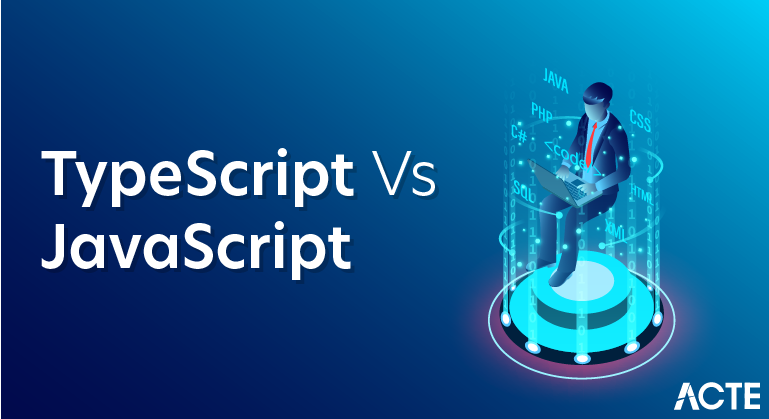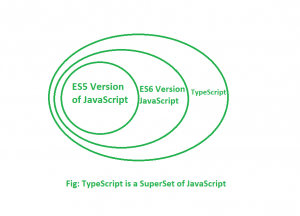

Why is TypeScript developed while having JavaScript?
When JavaScript was developed then the JavaScript development team introduced JavaScript as a client-side programming language. But when people were using JavaScript then developers get to know that JavaScript can be used as a server-side programming language also. But When JavaScript was growing then the code of JavaScript became complex and heavy. Because of this, JavaScript was even not able to fulfill the requirement of Object-oriented programming language. This prevents JavaScript from succeeding at the enterprise level as a server-side technology. Then TypeScript was developed by the development team to bridge this gap.
Features of TypeScript:
- TypeScript Code is converted into Plain JavaScript Code:: TypeScript code is not understandable by the browsers. That’s why if the code is written in TypeScript then it is compiled and converted the code i.e. translate the code into JavaScript.The above process is known as Trans-piled. By the help of JavaScript code, browsers are able to read the code and display.
- JavaScript is TypeScript: Whatever code is written in JavaScript can be converted to TypeScript by changing the extension from .js to .ts.
- Use TypeScript anywhere: TypeScript code can be run on any browser, devices or in any operating system. TypeScript is not specific to any Virtual-machine etc.
- TypeScript supports JS libraries: With TypeScript, developers can use existing JavaScript code, incorporate popular JavaScript libraries, and can be called from other JavaScript code.
Difference between TypeScript and JavaScript:
- TypesScript is known as an Object oriented programming language whereas JavaScript is a scripting language.
- TypeScript has a feature known as Static typing but JavaScript does not have this feature.
- TypeScript gives support for modules whereas JavaScript does not support modules.
- TypeScript has Interface but JavaScript does not have Interface.
- TypeScript supports optional parameter function but JavaScript does not support optional parameter function.
Advantages of using TypeScript over JavaScript
- TypeScript always points out the compilation errors at the time of development only. Because of this at the run-time the chance of getting errors are very less whereas JavaScript is an interpreted language.
- TypeScript has a feature which is strongly-typed or supports static typing. That means Static typing allows for checking type correctness at compile time. This is not available in JavaScript.
- TypeScript is nothing but JavaScript and some additional features i.e. ES6 features. It may not be supported in your target browser but TypeScript compiler can compile the .ts files into ES3,ES4 and ES5 also.
Disadvantages of using TypeScript over JavaScript
Generally TypeScript takes time to compile the code.
If you have ever worked on a web development project, you must have seen what JavaScript is like. JavaScript has been there for a long time now as the most popular scripting language for many web projects.
Typescript is an open-source programming language most suited for large applications. It was developed by Microsoft in 2012, mainly because JavaScript code was becoming too complex to handle when it comes to large-scale applications.
Difference between Typescript and Javascript
- Essentially, all your JavaScript code is also valid in Typescript – that means Typescript is a superset of JavaScript – or
- JavaScript + more features = Typescript.
- So, if you save your JavaScript (.js) file with a Typescript (.ts) extension, it will work perfectly fine. But that does not mean that Typescript and JavaScript are the same.
- Before outlining the differences between both, let us understand what each language looks like!
JavaScript
JavaScript is one of the most popular core technologies of the web. From the beginning, it has been an integral part of web applications making web pages interactive and dynamic. It is a high-level language, with JIT (Just-in-Time) compiler and dynamic typing. For long, JS was a client-side implementation, but some newer JS engines also have server-side implementations. The syntax of JS is very similar to Java, and so are the standard libraries. As a starting point, JS is the best scripting language to learn. JavaScript was developed by Netscape in collaboration with Sun Microsystems.
Some unique features of JavaScript are –
- Flexible, dynamic and cross-platform
- used for both client-side and server-side
- Lightweight interpreted
- Supported by all browsers
- Weakly typed
- JIT compilation
Let us take a simple example to illustrate how JavaScript works. The following simple HTML code is to validate a username field where myFunction() is written in JavaScript.
If you observe, the syntax of the functions is similar to Java, however, we have defined the variables as ‘var’ and not declared them as any type. The myFunction() function is triggered when the user clicks on a ‘Submit’ button and gives appropriate alert messages as per the conditions. Here is sample output –
It is that simple! If you know Java, JavaScript is fairly simple to learn.
TypeScript
TypeScript is no different from JavaScript in its purpose but is used for developing large applications. TypeScript trans compiles (source to source compilation) to JavaScript. It follows an object-oriented programming language structure and supports its features like classes, interfaces, namespaces, and inheritance. Static typing is possible in TypeScript through type annotations (numbers, string and boolean). For example,
As we see above, TypeScript is strongly typed. This makes it better to debug (during compile time itself) which is a more efficient way to code for large projects. TypeScript programs typically consist of modules, functions, variables, comments, expressions, and statements – just like any other full-fledged programming language. Some prominent features of TypeScript are –
- Easy to maintain and enhances project productivity
- Static typing and annotations are possible
- Supports object-oriented features like interface, inheritance, and classes
- Easy to debug and early detection of errors
- Supports ES6 (ECMAScript) that offers easier syntax to handle objects and inheritance features
- The good full-fledged IDE support
Does that make TypeScript better than JavaScript?
Before further comparison of TypeScript and JavaScript, another important question needs to be addressed! Since TypeScript is a superset of JavaScript, should we always use Typescript? Does being a superset makes TypeScript suitable for all types of projects?
TypeScript is no way to replace or make JavaScript obsolete. JavaScript is still the most favorite client-side scripting language. For smaller projects, using TypeScript could be an overhead because it takes time to trans compile the code into JavaScript, which is an extra step.
JavaScript is directly run on the browser, so for small code chunks, it’s easier to refresh and debug the code. In the case of TypeScript, we need a proper IDE and set up to run the code.
When should you migrate your project to TypeScript?
When the code becomes huge, complex to handle, and more prone to errors, it is better if some errors are caught during compile time itself. That is where TypeScript helps. The beauty is that the entire codebase written in Java can be reused as such.
Typescript vs Javascript: Head to head comparison
Now as we understand the basic features and purpose of both, let us explore some more low-level differences apart from what we have already learned so far –
| TYPESCRIPT | JAVASCRIPT |
|---|---|
| Superset of JavaScript developed to overcome code complexity for large projects | A scripting language that helps create dynamic web page content |
| Errors can be found and corrected during compile time | Errors can be found only during run-time as it is an interpreted language |
| Strongly typed, supports both static and dynamic typing | Weakly typed, no option for static typing |
| Converted into JavaScript code to be understandable for browsers | Can be directly used in browsers |
| Since it is a superset, all the JavaScript libraries, and other JavaScript code works without any changes | JS libraries work by default |
| There is support for ES3, ES4, ES5 and ES6 Supports modules, generics and interfaces to define data | No support for compiling additional ES3, ES4, ES5 or ES6 features |
| Functions can have optional parameters | No support for modules, generics or interface |
| Numbers, Strings are considered as interfaces. | This feature is not possible in JavaScript. Number, string are objects. |
| Powerful and intuitive language | Neat and clean, most suitable for simple web applications |
| The community support is still growing and not so huge | Huge community support with lots of documentation and support for solving issues |
| Prototyping is possible Takes time to learn and code, scripting knowledge is a must. | Prototyping support is not there Can be learned on the go, no prior scripting experience is needed. |
| Proper build setup (npm package) is required for static type definitions | No build setup is required |
Conclusion
As we have already determined, JavaScript is most suited when your team is new and is working on small web projects. If you have a team with good expertise and knowledge and want them to handle a complex project, going for TypeScript is a perfect choice.





